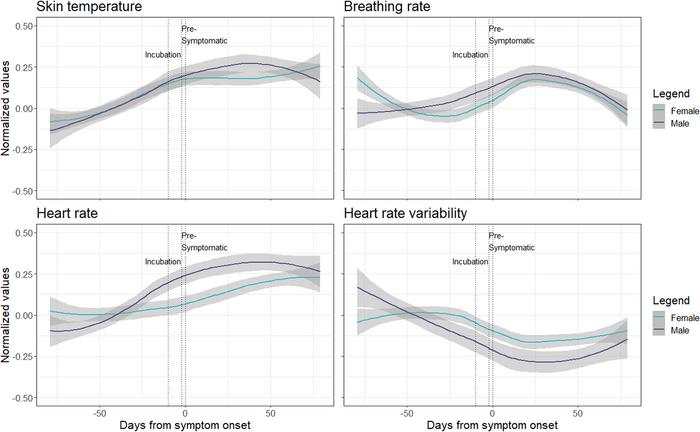Males and females have differential physiological responses to COVID-19 infections, with males having larger increases in skin temperature, breathing rate and heart rate during an acute infection. That is the conclusion of a new study that used data from wearable devices and was published this week in the open-access journal PLOS ONE by Lorenz Risch of the Private University in the Principality of Liechtenstein and collaborators.

Credit: Grossmann et al., 2024, PLOS ONE, CC-BY 4.0 (https://creativecommons.org/licenses/by/4.0/)
Males and females have differential physiological responses to COVID-19 infections, with males having larger increases in skin temperature, breathing rate and heart rate during an acute infection. That is the conclusion of a new study that used data from wearable devices and was published this week in the open-access journal PLOS ONE by Lorenz Risch of the Private University in the Principality of Liechtenstein and collaborators.
COVID-19 infections are known to impact physiological parameters including breathing rate, heart rate and skin temperature. A better understanding of sex-specific trajectories in these physiological changes could support the early detection and treatment of COVID-19
In the new study, (the COVI-GAPP study, www.covi-gapp.li), a member of the COVID-19 Remote Early Detection (COVID-RED) Consortium collected data on 1,163 people with the Ava wearable medical device. More than 1.5 million hours of physiological data were recorded and included in the new analysis. During the study period, spanning 2020 and 2021, 127 participants tested positive for COVID-19, of whom 82 had sufficient quality of data from the Ava app to include in the analysis.
The study found that, compared to females, males had larger increases in skin temperature, breathing rate and heart rate, and a larger decrease in heart rate variability during COVID-19 infection. Moreover, male participants’ breathing rate and heart rate remained at significantly higher levels during the recovery period as compared to their female peers. The study also tested potentially confounding variables, including BMI, age, hypertension, and alcohol and drug use, and found no impact of these variables on the associations between sex and physiology during infection. However, the study could not account for hormonal changes across the menstrual cycle among female participants.
The authors conclude that sex-specific biological responses to COVID-19 infection may be linked to the higher mortality and hospitalization rates observed in male COVID-19 patients. More work is needed to fully understand the biological underpinning of these sex differences.
The authors add: “The COVI-GAPP study has revealed significant sex-specific variations in vital parameter trends throughout the course of a SARS-CoV 2 infection. We firmly believe that utilizing wearable technology in research represents a valuable approach to gain deeper insights into diseases and their impacts, ultimately laying the groundwork not only for more timely and more accurate diagnoses but also for general advancements in precision medicine.”
#####
In your coverage please use this URL to provide access to the freely available article in PLOS ONE: https://journals.plos.org/plosone/article?id=10.1371/journal.pone.0292203
Citation: Grossmann K, Risch M, Markovic A, Aeschbacher S, Weideli OC, Velez L, et al. (2024) Sex-specific differences in physiological parameters related to SARS-CoV-2 infections among a national cohort (COVI-GAPP study). PLoS ONE 19(3): e0292203. https://doi.org/10.1371/journal.pone.0292203
Author Countries: Liechtenstein, Switzerland, Maldives, UK, Germany, The Netherlands, USA, South Africa, Canada
Funding: This work has received support from the Princely House of the Principality of Liechtenstein, the government of the Principality of Liechtenstein, the Hanela Foundation in Switzerland, and the Innovative Medicines Initiative (IMI) 2 Joint Undertaking under grant agreement No 101005177. This Joint Undertaking receives support from the European Union’s Horizon 2020 research and innovation programme and EFPIA. The funders had no role in study design, data collection and analysis, decision to publish, or preparation of the manuscript.
Journal
PLoS ONE
DOI
10.1371/journal.pone.0292203
Method of Research
Observational study
Subject of Research
People
Article Title
Sex-specific differences in physiological parameters related to SARS-CoV-2 infections among a national cohort (COVI-GAPP study)
Article Publication Date
6-Mar-2024
COI Statement
The authors have read the journal’s policy and have the following competing interests: Lorenz Risch, and Martin Risch are key shareholders of the Dr Risch Medical Laboratory. David Conen has received consulting fees from Roche Diagnostics, outside of the current work. Andjela Markovic, Vladimir Kovacevic, Martina Rothenbühler, Brianna Goodale and Maureen Cronin are past employees of Ava AG. Brianna Goodale and Timo Brakenhoff are current employees of Julius Clinical BV. Billy Franks is a former employee of Julius Clinical BV and now an employee of Haleon. Paul Klaver and Duco Veen are former employees of Julius Clinical BV. Marianna Mitratza is a current employee of P95 CVBA. There are no patents, products in development or marketed products associated with this research to declare. These competing interests do not alter our adherence to PLOS ONE policies on sharing data and materials.




